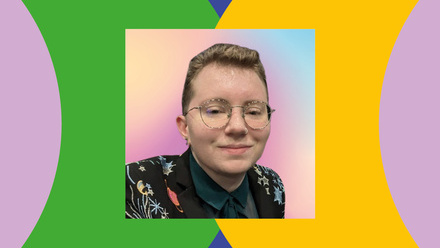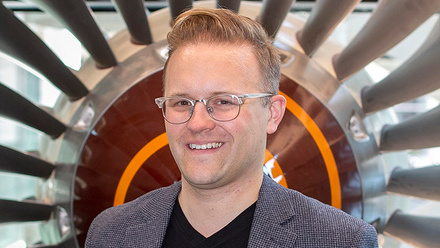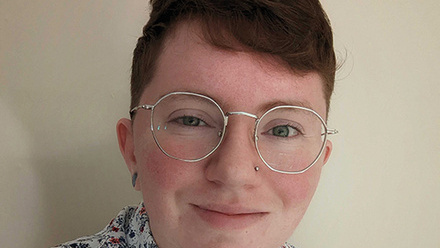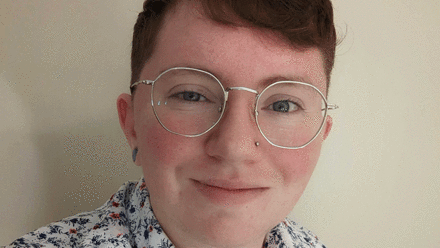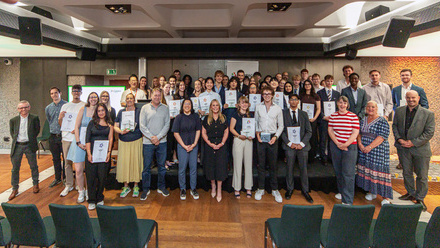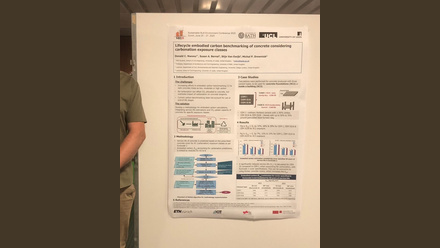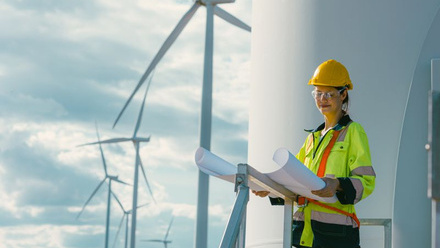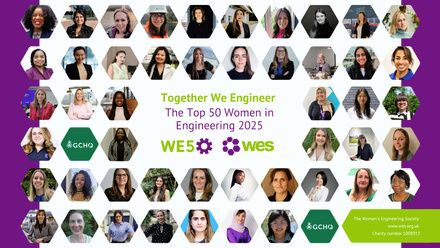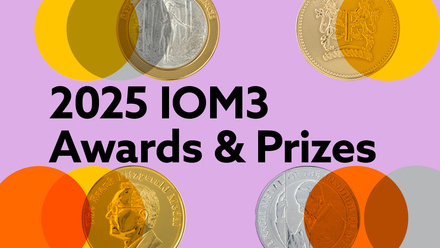Building communities
Alex Brinded catches up with Avery Cunningham AIMMM on his work as an EDI practitioner and inclusion advocate
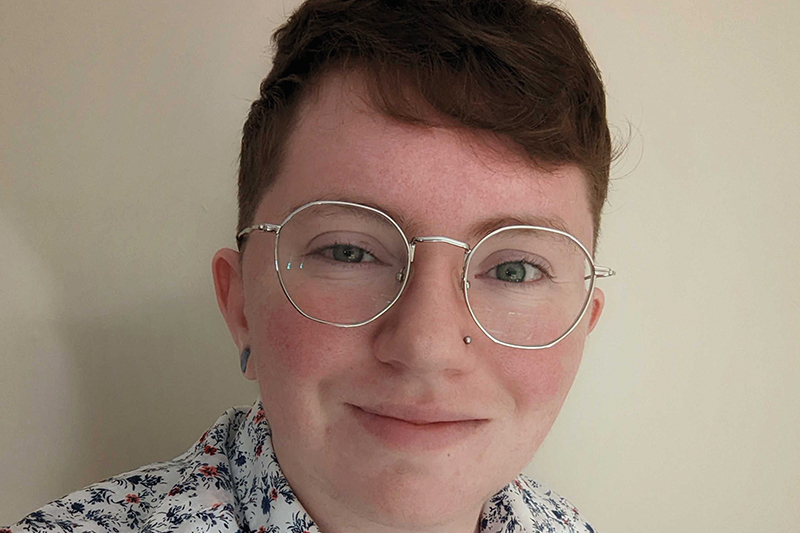
Hailing from Stourbridge in the Black Country in the West Midlands region of the UK, Avery Cunningham’s curiosity for science was piqued by an enthusiastic Biology and Chemistry teacher at secondary school, who learnt how to teach Physics and managed to arrange an insightful trip to CERN – the European Organisation for Nuclear Research – just before the Higgs boson particle was discovered.
There was a lot of concern that when they switched it on, the world was going to disappear into a blackhole.
The teacher’s passion and willingness to say 'I don’t know, let’s find out together' helped foster Cunningham’s interest in Physics at school, but he admits, 'I fell into Material Science a little bit by accident'.
Initially wanting to study theoretical Physics or Computer Science at university, 'the least applied Physics I could possibly find', he ended up changing his mind after working for a year on engineering projects at security and defence contractors QinetiQ. He was excited by their projects, returning every summer while at university.
Their work with nuclear power in particular led Cunningham to hone in on a BSc in Nuclear Science and Materials at the University of Birmingham, UK, which was 60% Physics and 40% Materials Science based in the Materials Science department.
The Materials Science section was a pleasant surprise. 'Until I was looking, I had no concept that Material Science was something that I could do…but thinking how the world is made up and put together was really interesting.'
He continues, 'The nuclear course is a good course if you can't pick between Physics and Engineering,' discovering he liked the crossover and getting to see real-world applications that solved real-world problems.
He then signed up to an MSc in Nuclear Decommissioning and Waste Management, as he was interested in the policy and communicatation of nuclear energy that was covered in his undergraduate modules. However, he didn’t end up finishing as, 'that’s when I started realising that the softer side of things was what I was actually really interested in. Talking about science and influencing how we do science'.
The theme has woven its way through his career to date. Cunningham now works with engineers but is not working in engineering himself. 'Engineering problems are still interesting but solving people problems are as well,' he muses.
People problems
During his undergraduate degree, his interest in working on equity, diversity and inclusion (EDI) matters flourished.
He became Chair of the University of Birmingham branch of Out in Science, Technology, Engineering, and Mathematics (oSTEM), a non-profit professional association for LGBTQIA+ people in the STEM community.
As well as student chapters all over the US and four other countries, including the UK, oSTEM also runs an annual conference that rotates around different US cities. His group applied for funding to attend the conference, and although not granted, they were allowed to run their own event at Birmingham, which Cunningham reveals hectically came together in just three months.
While his first involvement with LGBTQIA+ work was with oSTEM, he says he was initially quite resistant to get involved and wasn’t keen when he tried to go to an LGBTQIA+ group for the first time. 'Just because you’ve shipped a load of LGBTQIA+ people in one room doesn’t mean they’ve got anything in common.
'Part of what I liked about oSTEM is there was something else that linked us, mainly that everyone is kind of like a massive nerd who’s really into science or engineering…There’s an extra thing that brings you together versus a sexual orientation or your gender identity, which I found really important.
'And the thing about STEM is it’s so varied. I’ve got to hear wonderful things that people are doing that are in fields that I didn’t even know existed or conceived would exist.' He recalls learning his good friend was doing a PhD in space weather –something he didn’t even know existed.
It also helped that he wanted to impress a girl who ran oSTEM. 'And now I’m the Vice President of oSTEM and we’re getting married next year. So, it did work out.'
She must have been suitably impressed then, I asked.
'I think she’s less impressed now', he says half-joking, as his advocacy work is all encompassing. 'But I think she’s accepted that campaigning will be a part of our lives.'
He has worked his way up the ranks at oSTEM over the last six years, with previous voluntary roles including Director of Student Membership that involved looking after all 150 global chapters.
He then spent two years as Chair of their annual conference on top of his full-time position. Co-ordinating an event in a different country involved a lot of late nights and took its toll and, in the end, he moved to a different role within the organisation.
Now Vice President of International Affairs, he oversees oSTEM UK. He is trying to grow its membership in the UK, Canada and Mexico, as well as nurture non-chapter work around scholarships and advocacy.
Since his time at university, he is also Lead Organiser and Founder of STEM, LGBTQ & You, a day-long conference focused on LGBTQIA+ experiences in STEM. It was initially meant to be a one-off event, which spiralled into something more, and won an Outstanding Event Award in its first year.
Headspace
The switch from research to working in outreach and EDI in salaried positions came when he was a research assistant for four months.
It was a project run by an EDI officer on engineering physical sciences, looking at the reasonable adjustments required within those subjects, and included some training. Instead of completing his MSc and going on to a PhD, Cunningham realised 'I could get paid to do the stuff that I’ve been doing for free'.
He then went on to work as an Outreach Officer in Levelling Up at the University of Birmingham, which confusingly had nothing to do with the UK Government scheme of the same name. This scheme ran mentoring and tutoring for underrepresented groups from schools in the local area on Materials Science, Physics, Chemistry and Maths.
Cunningham wanted to share the benefits he had gained from the university’s widening participation scheme.
The free year-long programme involved site visits to labs for hands-on experience. And Cunningham also led a trip to Tyseley Energy Park, a partnership with Birmingham University, 'because I was very biased that they should like energy'.
While he wanted to do some mentoring himself, he understandably never had the time. 'I was always running around a bit like a headless chicken on those days trying to get them all to run at once…Generally, it was the logistics, the behind the scenes, the thinking of the ideas, to getting the academics together.'
As such, he has become a pro at facilitating and organising events, or as he puts it, creating ‘community spaces’. 'A lot of them end up being events, but I’m a big believer in creating spaces for people to feel like they can be part of something.'
So, while supporting students from deprived areas to get their A-levels was important, the outreach work 'was also about creating that space, them seeing people like themselves on a campus, to envision where they could be'.
Part of the reason he still likes doing events and conferences, is interacting with people who are very passionate about their subjects. 'It’s really nice to be able to facilitate those things, similar to when I was doing the outreach stuff, having 16-year-olds pretend they’re not interested, but then breaking down those barriers that they actually do think this stuff is cool and they are allowed to think it is.'
Cunningham now continues his paid EDI work through Birmingham City University as an EDI Business Partner in their HR team.
Finding your people
It feels like Cunningham has had a very clear idea of who he is for some time, and branching out into EDI support for engineers is the natural convergence of his different interests.
However, he reveals that he didn’t come out as transgender until later on in his career. He didn’t feel the defence sector was the space to do that. Also, 'the idea of working somewhere remote, somewhere without a city, somewhere where I couldn’t find that kind of community didn’t appeal to me as much as well'.
At the time, he felt the culture at universities 'fit me a little better'.
Take pride
He has recently taken on the mantle of Chair of the IOM3 network IOM3 Pride, having been Vice Chair for the previous four years. He is attempting to revitalise the group as it has quietened down, despite a strong start online during COVID-19. He would love to reach out to anyone interested to get involved.
He acknowledges, 'We’re a small group…but moving to a space where I want to build that community aspect'.
He wants the group to be a voice for IOM3 and people within IOM3 to support colleagues in the best way possible. He hopes to partner with 'allies' like Inter Engineering and Equal Engineers, as 'we’re all working towards the same goal. So, positioning ourselves and being able to support others and being part of a larger group'.
Cunningham suggests we need to move past awareness raising towards conversations around diversity or inclusion so they are embedded as business-as-normal rather than a separate thing. He is aware that not all issues have been solved, such as the representation of women in engineering. He asks, how can LGBTQIA+ people be part of those conversations. 'Are we talking about all voices that become the same level?'
He shares that he still has some 'exhausting conversations about why does it matter?...I think people still don’t acknowledge that their entire self does influence everything that they do'.
For example, he explains, in Maths there is a common thought experiment called the stable marriage problem. As Avery says, if you didn’t have the concept of marriage, or could not legally marry, the problem could not be framed in such language. Even mathematicians think the sum is greater than its parts.
'It’d be nice to not have to use my own personal stuff all of the time” to drive these conversations, adds Cunningham. But also recognises the value of using his own experiences to influence people.
Online, his name is heavily affiliated with EDI work, and he is aware that if he took some of those LGBTQIA+ activities from his CV, his working career would be much more limited.
The reason for considering what seems a retrograde step is that Cunningham notes friends in the US who, since January, are being advised by mentors or colleagues to remove certain things from their CVs. The advice is being couched as, due to changing EDI or DEI policies, it is better if you don’t signal or flag those activities. 'Obviously, I never want to go back to having that type of thing'.
Even now, being LGBTQIA+ in science and engineering can be restrictive, Cunningham shares. He has been advised to think carefully about which conferences to go to, depending on the country they are being held in.
Although he doesn’t feel part of the leaky pipeline, whereby individuals from underrepresented groups drop out of STEM at various stages of their education and careers, he describes himself as ‘STEM-adjacent’, as his day job moves further away from practical science.
But being steadfast in his commitment to his advocacy work has earned him a nomination for a Positive Role Model Award at the National Diversity Awards 2025, with the winners announced in September.
'I think I'll always consider myself an engineer. It’s how I think about things as well…I think it doesn’t quite leave you once you’ve got into it.'
Acronym allies
- IOM3Pride is a voluntary committee of IOM3 whose goal is to achieve equality of opportunity professionally for LGBTQIA+ identifying IOM3 members, through support, awareness raising of issues and inequalities within relevant sectors, and aiding the development of understanding, policies and data.
- Out in Science, Technology, Engineering, and Mathematics (oSTEM), Inc. is a non-profit professional association for LGBTQIA+ people in the STEM community. With over 150 collegiate chapters at colleges/universities and professional chapters in cities across the US and abroad, oSTEM is the largest chapter-based organisation focused on LGBTQIA+ people in STEM.
- STEM, LGBTQ & You is the UK regional conference for oSTEM and aims to bring LGBTQIA+ STEM people and allies together.
- InterEngineering is a professional network to connect, inform and empower lesbian, gay, bisexual and transgender engineers and their straight allies.
- Equal Engineers aims to create inclusive engineering and technology organisations by increasing the diversity of their workforce and improve stakeholder health and wellbeing. They do this by connecting inclusive employers with diverse candidates in engineering and technology.


